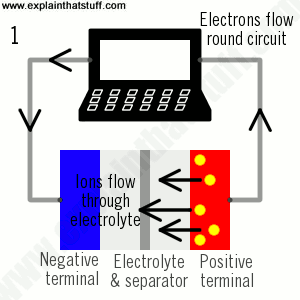Forklift Technical Information
The largest forklift operator training website in the world
![]()
![]()
Lithium ion batteries for forklift trucks

Lithium Ion batteries were invented by Sony in 1991. Lithium-ion batteries power the lives of millions of people each day. From laptops and cell phones to hybrids and electric cars and increasingly, forklift trucks. This technology is growing in popularity due to its light weight, high energy density, and ability to recharge.
How do lithium Ion batteries work? (By Explain that stuff)
As their name suggests, lithium-ion batteries are all about the movement of lithium ions: the ions move one way when the battery charges (when it's absorbing power); they move the opposite way when the battery discharges (when it's supplying power):
-
During charging, lithium ions (yellow circles) flow from the positive electrode (red) to the negative electrode (blue) through the electrolyte (gray). Electrons also flow from the positive electrode to the negative electrode, but take the longer path around the outer circuit. The electrons and ions combine at the negative electrode and deposit lithium there.
-
When no more ions will flow, the battery is fully charged and ready to use.
-
During discharging, the ions flow back through the electrolyte from the negative electrode to the positive electrode. Electrons flow from the negative electrode to the positive electrode through the outer circuit, powering your laptop. When the ions and electrons combine at the positive electrode, lithium is deposited there.
-
When all the ions have moved back, the battery is fully discharged and needs charging up again.
Advantages of Lithium Ion over lead acid batteries
(From an article by Toyota forklifts). Lithium-ion batteries can offer forklift users an advantage by increasing efficiency. If the conditions are right for the investment and the space is available for charging, there are several key factors that may lead a company to adopting this energy solution.
Consistent Power
Whether you have a single-shift, single-forklift operation or a large fleet working 24-hours a day, one important factor in delivering results and projecting milestones is consistent power throughout the charge of the battery. Lithium-ion forklift batteries deliver consistent power and battery voltage throughout the full charge; lead-acid battery charges deliver declining power rates as the shift wears on.
Faster Charging Speeds
In the context of day-to-day operations, lithium-ion forklift batteries offer significantly faster charging speeds and don’t require charging cooldown. This can help optimize daily productivity or even reduce the number of forklifts needed to complete objectives.
Opportunity Charging
Lithium-ion forklift batteries can be opportunity charged in any setting, eliminating the need for time-consuming battery swaps.
Fewer Required Batteries
Lithium-ion forklift batteries can remain in equipment longer where one battery can take the place of three lead-acid batteries in a multi-shift use setting. This helps eliminate the cost and storage space required for additional lead-acid batteries.
Virtually Maintenance Free
Lithium-ion batteries are virtually maintenance free, requiring none of the watering, equalizing, and cleaning needed to maintain lead-acid batteries.
Disadvantages of Lithium Ion batteries.
The biggest environmental danger posed by lithium mining is the amount of water the process uses up: an estimated 500,000 gallons of water per ton of lithium extracted. This can endanger the communities where the lithium is being mined because it can cause droughts or famine if operations are not kept in check.
There are also stories of youngsters working many hours a day for a pittance in certain parts of the world mining lithium.
(Webmaster's note). I looked on line at prices in 2019 and found a 13.2 volt Lithium Ion Traction battery for £2229 and a 48 volt Lead Acid battery for £1629. Not a fair comparison I know but it does suggest a huge price difference like for like